|
Limitar tu búsqueda
[+–] Editorial
[+–] Fecha
[+–] Formato
[+–] Idioma
[+–] Tipo de documento
[+–] Tipo de recurso
[+–] Classification
|

|
|
Provisional and welfare inclusion in Brazil (1988-2005): scope and limits
This paper analyses the influence of new rights derived from the Social Security System in Brazil after the Federal Constitution (1988). At least, three different and independent forces determinate the arrangements in social security policies: 1) the new social rights created by constitutional rules in response to social pressure; 2) the decrease of employment and wages in salaried jobs imposed...
|
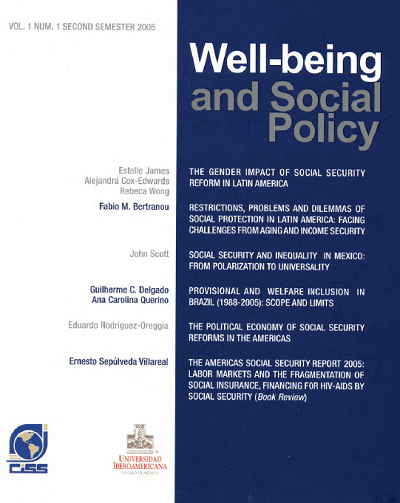
|
|
|
|

|
|
Social security and inequality in Mexico: from polarization to universality
The article documents the failure of social security in Mexico as an instrument of social protection and evaluates possible reform strategies. It analyses the truncated coverage of these systems for the most vulnerable, the regressive incidence and horizontal inequities of public social security subsidies, and the consequences for old-age poverty and inequalities in basic health opportunities. It...
|
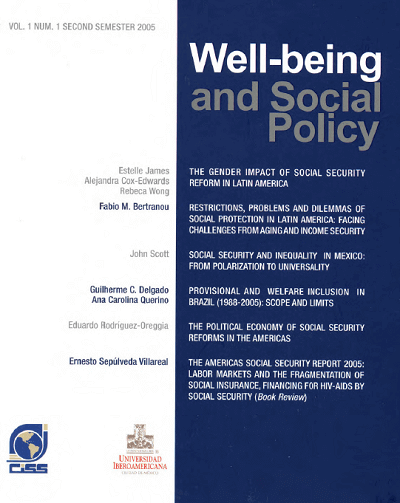
|
|
|
|

|
|
Restrictions, problems and dilemmas of social provision in Latin America: facing challenges from aging and income inequality
This paper discusses the main restrictions, problems and dilemmas that social provision faces in Latin America in a context of demographic changes and low achievements in the economic performance, particularly in the labor market. It is proposed the need to adapt the general social provision matrix as function of priorities and restrictions set by financing access. Due to the limited labor...
|
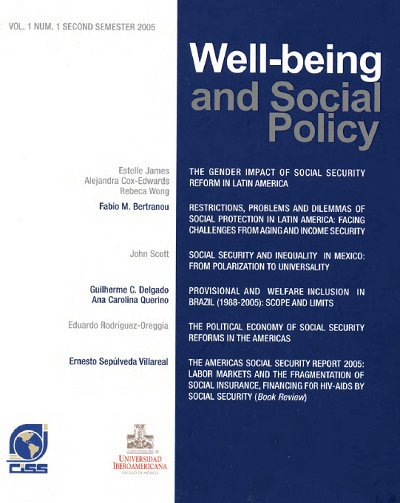
|
|
|
|

|
|
The gender impact of social security reform in Latin America
Recent multi-pillar pension reforms tighten the link between payroll contributions and benefits, leading critics to argue that they will hurt women, who have less continuous employment and earn lower wages than men. However, these reforms also remove distortions and target redistributions to low earners, which help women. This paper tests these conflicting claims in the case of three Latin...
|
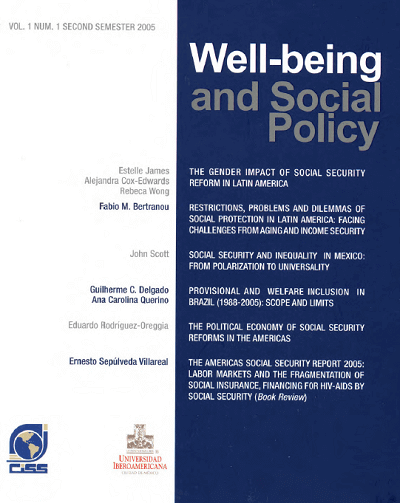
|
|
|
|

|
|
Seguro social de salud
El gobierno de México definió entre los años noventa y los dos mil principios de reforma a los seguros de salud e intentó implementarlos. Las principales iniciativas aprobadas definieron esquemas voluntarios, en un caso basado en aseguradoras privadas (que tienen muy baja penetración), y en otro, en una nueva instancia pública que funciona como mecanismo de distribución del gasto federal hacia...
|
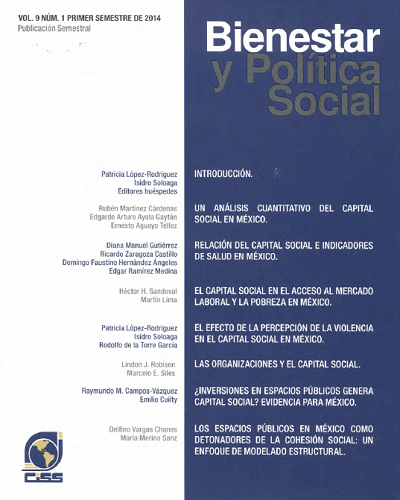
|
|
|
|

|
|
Introduction (about the international conference on "The quality of education in Latin America and the Caribbean")
The Inter-American Conference on Social Security (CISS) and Universidad Iberoamericana (UIA) co-hosted an international conference on "The Quality of Education in Latin America and the Caribbean" in February 2007. The main obj ective of the conference was to examine quality of education in the region, the determinants of learning, policy and program evaluation, and the impact of quality of...
|
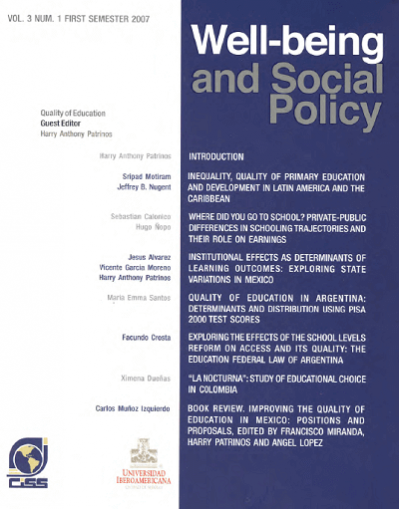
|
|
|
|

|
|
Where did you go to school? Private-public differences in schooling trajectories and their role of earnings
The private provision of educational services has been representing an increasing fraction of the Peruvian schooling system, especially in recent last decades. While there have been many claims about the differences in quality between private and public schools, there is no complete assessment of the different impacts of these two type of providers on the labor markets. This paper is an attempt...
|
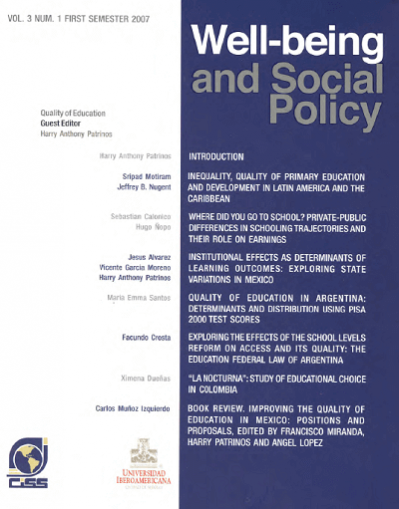
|
|
|
|

|
|
Seguridad social universal centrada en el ciudadano
Este ensayo revisa la situación de la protección social en México, así como diversas propuestas y opciones para su reforma. Una guía es el concepto de piso de protección social que han definido la Organización Internacional del Trabajo y la Organización Mundial de la Salud. Se tratan temas de forma más general bajo los grandes apartados de programas de familia, pensiones, salud y empleo, así como...
|
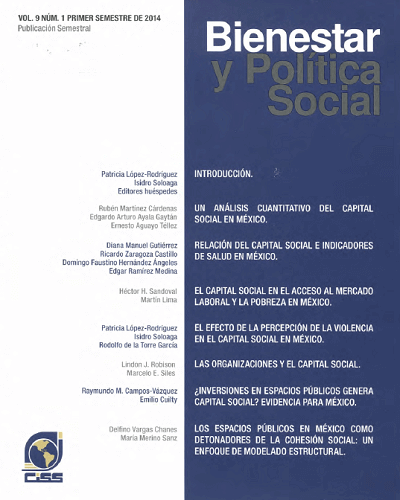
|
|
|
|

|
|
Is age-grade distortion in Brazil's primary public education system more closely associated to school infrastructure or to family characteristics
Different economic studies have shown the importance of education in improving the quality of life of individuals. Thus, in the 90’s, the public education system was reformed to enhance the quality of public education in Brazil and motivate student interest. This paper participated in this discussion by suggesting an assessment of the impact that school infrastructure and family characteristics...
|
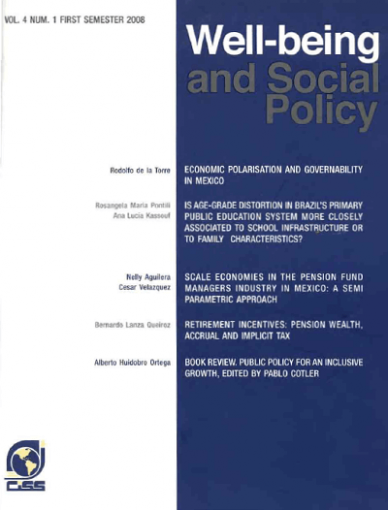
|
|
|
|

|
|
Financial development and the distribution of income in Latina America and the Caribbean
One of the central concerns in Latin America an the Caribbean (LAC) has been the reduction of poverty and inequality so prevalent in the continent. Using large world samples, the literature has found that financial development increases economic growth, increases the income of the poor, and reduces inequality. This paper studies the effects of financial development on the whole distribution of...
|
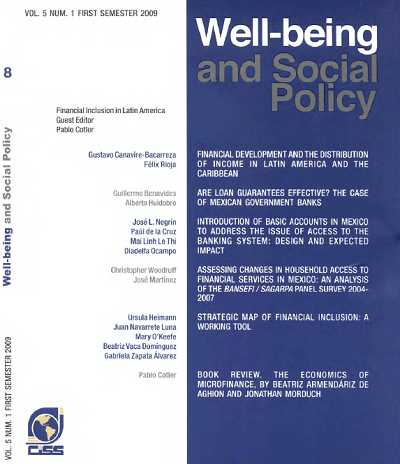
|
|
|
|

|
|
Book review. Beyond survival. Protecting households from health shocks in Latina America, by Baeza, Cristian C., y Truman G. Packard
The book by Cristian Baeza and Truman Packard is based on the next hypothesis: adverse health events reduce the consumption of goods and services different from health services, and many households become poor because of that. While the authors recognize that the evidence they present on the topic is limited, they propose the use of a “universal risk pool” as a way to eliminate the problem of...
|
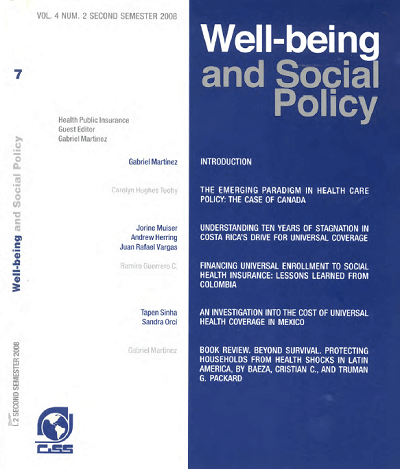
|
|
|
|

|
|
An investigation into the cost of universal health coverage in Mexico
The Mexican social security system, after operating for over six decades, has managed to provide healthcare for slightly over half the resident population.
There are wide geographical and socioeconomic variations in coverage. To provide wider coverage, the Federal Government created the Sistema de Protección Social en Salud (SPSS) for covering low income family. It becomes the third...
|
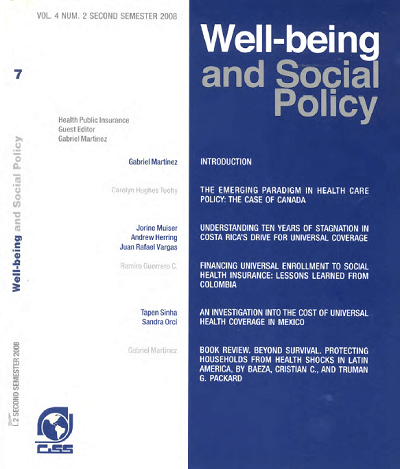
|
|
|
|

|
|
Financing universal enrollment to social health insurance: lessons learned from Colombia
The paper discusses the financing of the health care reform implemented in Colombia since the early nineties and explains the obstacles faced on the way to universal enrollment to social health insurance. The paper describes the reform and the sources created for its financing. It presents the observed trends in the financing of the insurance schemes created by the reform, identifies the...
|
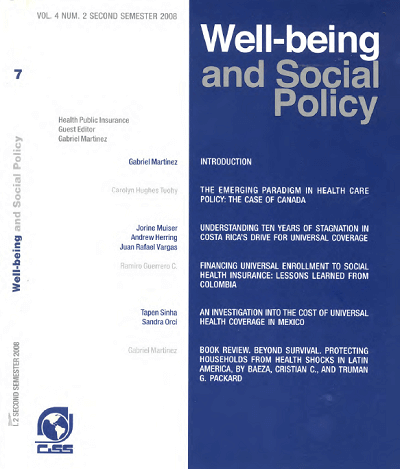
|
|
|
|

|
|
Understanding ten years of stagnation in Costa Rica's drive for universal coverage
This study analyzes achievements and obstacles in the process of moving towards universal coverage of essential health care services in Costa Rica. It describes the country as exemplary in the region, both in terms of population health status as well as health financing indicators. Life expectancy and the level of pre-payment are both comparable to high income countries. However, the process that...
|
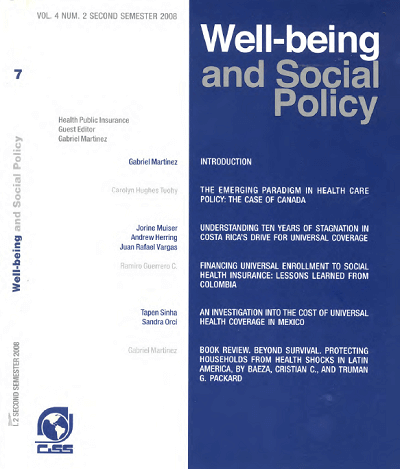
|
|
|
|

|
|
The emerging paradigm in heatlh care policy: the case of Canada
The model of health care financing and delivery for which Canada is best known internationally is its universal, single-payer, first-dollar system of coverage for physician and hospital services. For several decades following its establishment in the late 1950's and 1960's, this model provided public finance from the general tax base (like the UK), at levels of generosity, relative to GDP, like...
|
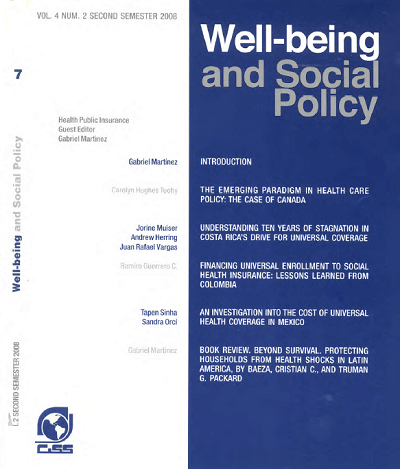
|
|
|
|

|
|
Introduction (on the subject that is addressed in the issue number)
In this issue of Well-being and Social Policy we have tried to include articles that support the debate around social insurance in health. This is an issue in which simple answers are hardly ever found, and a long term effort is required to understand the idiosyncrasy of each country and the best mix of regulation and financing options. Additionally, the studied cases point out to the need of a...
|
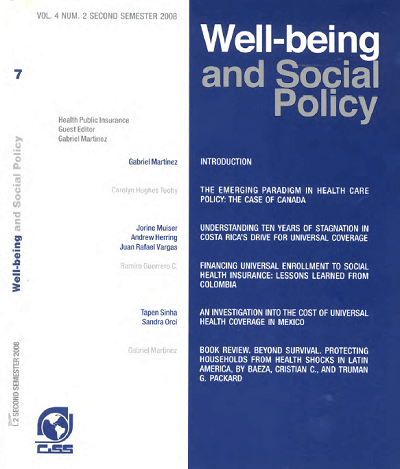
|
|
|
|

|
|
Book review. Public policy for an inclusive growth, edited by Pablo Cotler
The book “Public Policy for an Inclusive Growth” (The book) is an opportune and fortunate document. It is opportune because it is presented at a time in which public policy topics are subject to a wide debate in Mexico, and the discussion is fed with diverse points of view, theoretical and political, from which it is the purpose to analyze, design, redesign, implement, and evaluate the government...
|
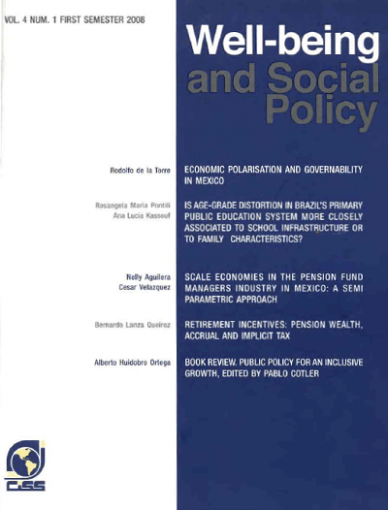
|
|
|
|

|
|
Retirement incentives: pension wealth, accrual and implicit tax
This paper estimates social security financial incentives for early retirement using contemporary techniques developed in economics, and compares these estimates to those estimated for developed countries. I find that implicit tax on continued work increases with age and amounts to over one-third of an individual potential earnings at age sixty-five. The pension replacement rate shows the degree...
|
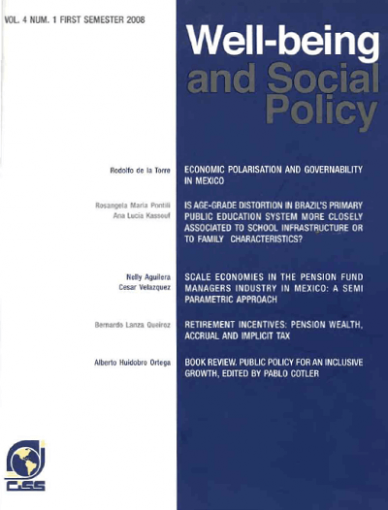
|
|
|
|

|
|
Scale economies in the pension fund managers industry in Mexico: a semi parametric approach
It has been widely accepted that reforms on pension schemes have led to improvements in the financial viability of the systems. Nevertheless, at the same time it has been shown that fees charged by pension fund managers (PFM) are very high, implying high mark-ups for them and lower expected pensions for the participants. The presence of economies of scale has been suggested as one main reason for...
|
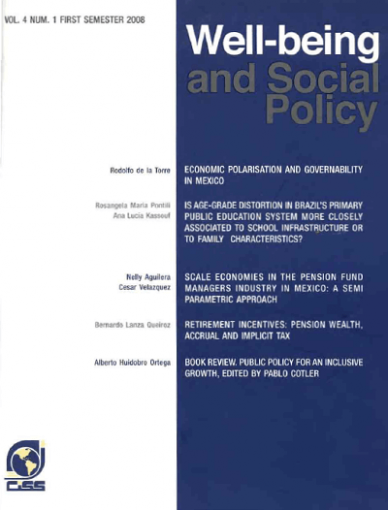
|
|
|
|

|
|
Economic polarisation and gobernality in México
The purpose of this essay is to appraise alternative hypothesis about the origins of recent social revolt in Mexico. It shows that it is not clear that a severe rise in poverty preceded the origins of violent conflict but social polarisation. Therefore, government attempts to deactivate the economic factors that led to social unrest did not necessarily upgrade povertyreduction policies. The...
|
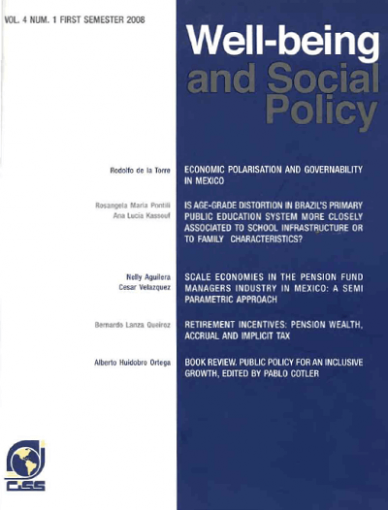
|
|
|
|
|